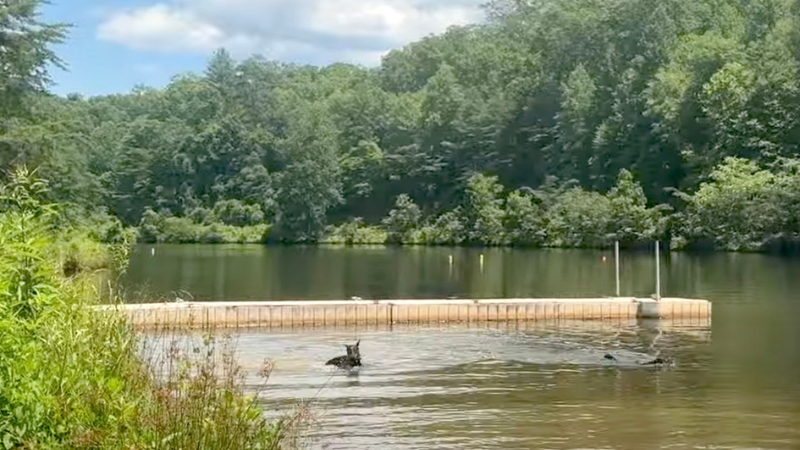Sometimes it takes something as small and ordinary as a green bean to show us how quickly our assumptions take over. When Jen handed me that single bean and said she found it on the “boat dock,” my mind immediately jumped to conclusions—about people, places, and even intentions. Only later did I realize she had said “boat ramp,” not “boat dock.” That subtle difference shifted everything. What looked like a mystery of intruders and misplaced vegetables became instead a lesson in how context shapes our stories—and how easily our brains fill in the gaps.
As she walked up to the Pavilion from the lake, my brain projected Jen’s path as coming from the boat dock. She had been down there playing with the dogs. Jen’s dog Smalls loves to jump in the water off the boat dock, while my dog Piper thinks jumping off a boat dock is a great activity – for other dogs. She doesn’t mind splashing in the water as long as her feet can touch the ground.
Jen handed me a fresh green bean and said “I found this on the boat dock.” My mind immediately pictured this expanse of floating plastic sitting 12 inches off the surface of the lake and concluded that the only way that green bean got there was by human intervention.
Trying not to jump to conclusions, we started talking possibilities as to WHICH human had left the green bean. Russ said “Austin must have been eating green beans while gassing up the boat.” Knowing that Austin is a lot like me around vegetables, I thought it was a cold day in hell that he would be eating raw green beans anytime, much less while working around the lake. But since I always say “Check it out”, I sent him a text to check that theory. Of course, he had not been eating green beans.
Now the problem felt a lot more unsettling. None of the four humans that typically use the boat dock had put a fresh green bean on the dock. So, who was the human that did such a thing?
Jen and I walked the dogs and talked about how much we didn’t like the idea that someone had sneaked through the gate. Why a green bean? Why only one? It seems like green beans typically travel in groups. Where were the rest of them?
We left that topic and talked about other things, but before long we returned to the mystery. I asked, “Exactly where on the dock did you find it?” Jen said, “In the middle of the other debris on the boat ramp.”
That’s when I heard a word I had missed before.
Jen said “…boat RAMP.” My brain had consistently fed me the word boat DOCK. The boat ramp is where we launch boats, and it glides into the lake making it easy to back a boat in.
Two things immediately happened. First, I was not nearly as worried about where the green bean had come from. This location offered dozens of new opportunities. It could have come from a garden upstream. It could have come from someone outside the camp eating green beans near the stream. Someone could have thrown or dropped it in the lake.
Second, I wondered why I heard boat dock, when Jen has clearly and consistently said boat ramp.
As I rewatched the reel in my memory, I realized that when I saw her walking up from the lake, I interpolated her path as coming from the dock, not the ramp. With that context, my brain was primed to assume boat dock.
In 2016, I wrote a blog called “Context Changes Everything.” In another story involving the lake, I told the story of believing that a click I heard on my ski was from a turtle surfacing underneath me. In that setting, the turtle that usually sat on a log where we dropped at the end of the lake was not there on this day. His absence made me question his location, and when I heard the click, I jumped to the conclusion that he had caused it. That jump led to a pretty serious ski fall, because the click was a failure of my ski equipment. However, the context had colored my judgment.
The “green bean story” reminds me again of how important context is in drawing conclusions. A year ago April, yet another event involving context sent me down the path of discovery. We discovered a bag of dog poop hanging from a tree on the main road into the camp. Once again, context deeply affected the assumptions we tested (and the stories we made up.)
As I came away from the green bean episode, two things stood out. First, context is always shaping the way I interpret what’s in front of me—sometimes without me even realizing it. Second, I have the power to set context in a way that helps others see more clearly, too.
That’s why meetings without context drive me crazy. When no one explains why we’re here, what we’re trying to do, or what outcome we’re aiming for, my brain spins trying to fill in the blanks. It’s like mistaking a boat dock for a boat ramp—without context, I’m working off the wrong picture.
The opposite is true as well: when I deliberately set context, everything changes. People listen differently. They understand where we’re headed. They make better assumptions. And together, we create something useful instead of wasting time.
So the next time I catch myself jumping to conclusions—or sitting in a meeting wondering what’s going on—I’ll remember that lone green bean. Context can be the difference between confusion and clarity, between wasted effort and meaningful progress.
How often do you discover that context shaped your thinking about something? In what ways do you use the power of context to shape your world?

